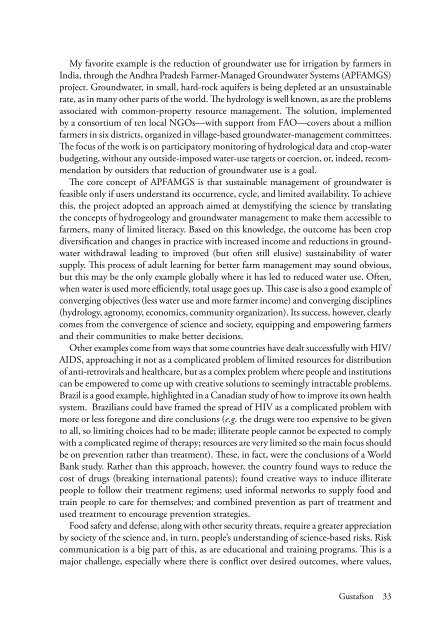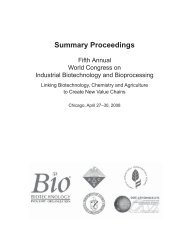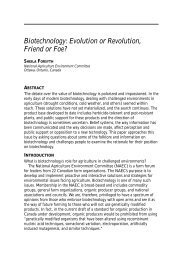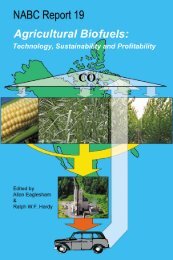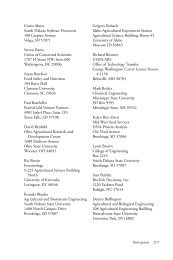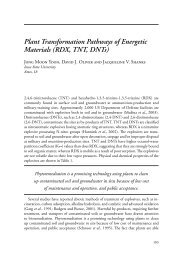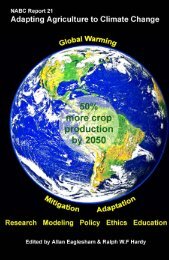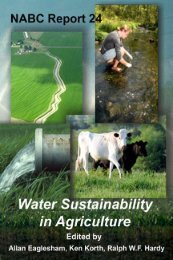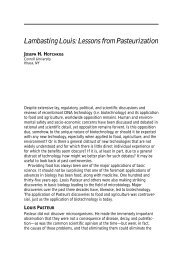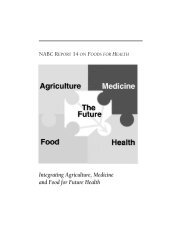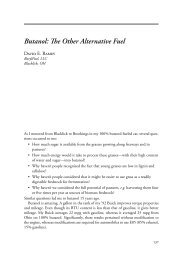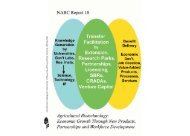Food Security - National Agricultural Biotechnology Council ...
Food Security - National Agricultural Biotechnology Council ...
Food Security - National Agricultural Biotechnology Council ...
- No tags were found...
Create successful ePaper yourself
Turn your PDF publications into a flip-book with our unique Google optimized e-Paper software.
My favorite example is the reduction of groundwater use for irrigation by farmers inIndia, through the Andhra Pradesh Farmer-Managed Groundwater Systems (APFAMGS)project. Groundwater, in small, hard-rock aquifers is being depleted at an unsustainablerate, as in many other parts of the world. The hydrology is well known, as are the problemsassociated with common-property resource management. The solution, implementedby a consortium of ten local NGOs—with support from FAO—covers about a millionfarmers in six districts, organized in village-based groundwater-management committees.The focus of the work is on participatory monitoring of hydrological data and crop-waterbudgeting, without any outside-imposed water-use targets or coercion, or, indeed, recommendationby outsiders that reduction of groundwater use is a goal.The core concept of APFAMGS is that sustainable management of groundwater isfeasible only if users understand its occurrence, cycle, and limited availability. To achievethis, the project adopted an approach aimed at demystifying the science by translatingthe concepts of hydrogeology and groundwater management to make them accessible tofarmers, many of limited literacy. Based on this knowledge, the outcome has been cropdiversification and changes in practice with increased income and reductions in groundwaterwithdrawal leading to improved (but often still elusive) sustainability of watersupply. This process of adult learning for better farm management may sound obvious,but this may be the only example globally where it has led to reduced water use. Often,when water is used more efficiently, total usage goes up. This case is also a good example ofconverging objectives (less water use and more farmer income) and converging disciplines(hydrology, agronomy, economics, community organization). Its success, however, clearlycomes from the convergence of science and society, equipping and empowering farmersand their communities to make better decisions.Other examples come from ways that some countries have dealt successfully with HIV/AIDS, approaching it not as a complicated problem of limited resources for distributionof anti-retrovirals and healthcare, but as a complex problem where people and institutionscan be empowered to come up with creative solutions to seemingly intractable problems.Brazil is a good example, highlighted in a Canadian study of how to improve its own healthsystem. Brazilians could have framed the spread of HIV as a complicated problem withmore or less foregone and dire conclusions (e.g. the drugs were too expensive to be givento all, so limiting choices had to be made; illiterate people cannot be expected to complywith a complicated regime of therapy; resources are very limited so the main focus shouldbe on prevention rather than treatment). These, in fact, were the conclusions of a WorldBank study. Rather than this approach, however, the country found ways to reduce thecost of drugs (breaking international patents); found creative ways to induce illiteratepeople to follow their treatment regimens; used informal networks to supply food andtrain people to care for themselves; and combined prevention as part of treatment andused treatment to encourage prevention strategies.<strong>Food</strong> safety and defense, along with other security threats, require a greater appreciationby society of the science and, in turn, people’s understanding of science-based risks. Riskcommunication is a big part of this, as are educational and training programs. This is amajor challenge, especially where there is conflict over desired outcomes, where values,Gustafson33


